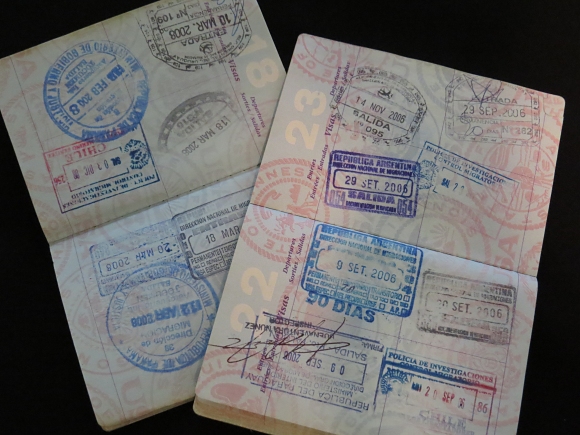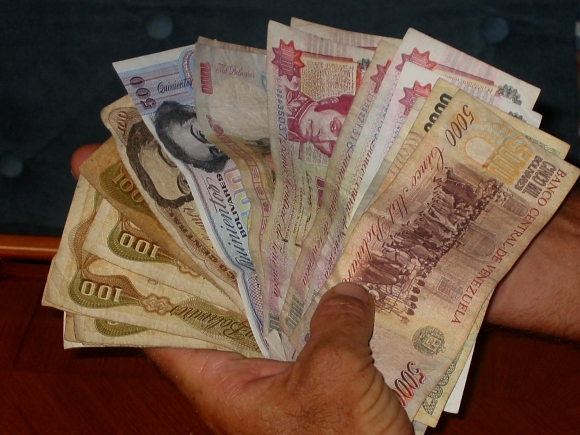10 Things You Should Know When Clearing into a New Country with Your Boat
/ Each country has its own set of rules for yacht* arrivals. Some countries are quite relaxed and easy. Just show up with your money in your hand and they'll lead you through the process. Other countries are much more stringent and you'll pay penalties if you don't comply with their arrival process...sometimes the process starts in advance of your arrival. It pays to do your homework.
Each country has its own set of rules for yacht* arrivals. Some countries are quite relaxed and easy. Just show up with your money in your hand and they'll lead you through the process. Other countries are much more stringent and you'll pay penalties if you don't comply with their arrival process...sometimes the process starts in advance of your arrival. It pays to do your homework.
1. Know the rules for pre-arrival notification.
Some countries require several days advance notice of your arrival by email or fax (e.g. Australia, New Zealand, Fiji). Some require an email or radio call when you enter their territorial waters (e.g. Peru and Chile). Australia is the only country we've visited which requires a visa prior to arrival. You can check with other cruisers, consult a current cruising guide for the country, or, for the best up-to-date information, visit the country's website for yacht arrival information. Noonsite is an excellent source for check-in information as well.
2. Pets aboard require extra research.
 Again, some countries are fine if you have “typical” pets aboard, e.g. dogs, cats. Others have strict rules and may require quarantine or strict adherence to keeping the animal aboard while in port. Check with the specific country you intend to visit in advance. We traveled with a cat for many years and had no problems in the Carib, South Africa or South America, but French Polynesia, New Zealand and Australia have strict rules about animals arriving by yacht. There will usually be fees associated with bringing a pet into the country. Most countries do require a current (within six months) International Heath Certificate indicating that the animal is healthy and all shots are up to date.
Again, some countries are fine if you have “typical” pets aboard, e.g. dogs, cats. Others have strict rules and may require quarantine or strict adherence to keeping the animal aboard while in port. Check with the specific country you intend to visit in advance. We traveled with a cat for many years and had no problems in the Carib, South Africa or South America, but French Polynesia, New Zealand and Australia have strict rules about animals arriving by yacht. There will usually be fees associated with bringing a pet into the country. Most countries do require a current (within six months) International Heath Certificate indicating that the animal is healthy and all shots are up to date.
3. Know the rules for importing freshies.
Many countries will take all fresh veggies, fruit, meat, cheese, eggs and dispose of them on arrival. If you know in advance, you can eat them en route and save having them confiscated.
4. Know the import limitations for taxable items.
There are usually rules and regulations regarding how much alcohol (spirits, wine, beer) and tobacco products you can bring in on the boat. Sometimes you're allowed extra as part of “ship's stores”. Other times, you'll be charged a tax for anything above the allowable limits or the excess will be “bonded” (either taken off the boat and returned when you leave or sealed in a locker on board). In our experience, Caribbean and South American countries were relaxed about this and Australia was not.
 5. Have your paperwork ready.
5. Have your paperwork ready.
This will include at least your boat papers, passports, clearance from your last port of call and a crew list.** Some countries (NZ and Australia) will provide advance arrival packets in foreign ports or make them available for downloading from the internet, so that all paperwork can be completed in advance. Note that you usually need 6 months left on your passport to enter a new country.
6. Announce your arrival into the country.
Fly your yellow Q (quarantine) flag on the starboard flag halyard upon entry and leave it there until you're cleared in. Make sure your national flag is flying when you arrive. Announce your arrival by VHF to the Port Captain, Harbormaster or as instructed in the country's arrival procedure. Remove the Q flag and hoist the country's courtesy flag on the starboard halyard once you've been officially cleared in. We're lazy. We fly the courtesy flag above the Q flag and then just take down the Q flag after clear-in. Technically, this is not correct, but we've never been “reprimanded” for it.
7. Expect visits from the officials.
Don't get off the boat unless instructed to. Don't make contact with anyone while you're in quarantine or give anything to anyone. Most countries insist that they clear you in before you step off the boat. Customs, Quarantine/Health and Immigration are usually the first aboard. Then perhaps, the Port Captain will appear. Depending on the country, maybe a few more officials will show up. Sometimes they just like coming aboard foreign vessels. On occasion, and usually in third world countries, you'll be asked for “gifts”. We usually played dumb. Sometimes we provided coffee and cookies as the “gift”. We did not pay extra money. If you're at anchor, they come by dinghy or sometimes you have to go pick them up.
8. Pay your fees.
The only countries we've ever visited that charged no check-in fees were the French territories (Guadeloupe, Martinique, St. Martin and New Caledonia) and New Zealand. Otherwise, be prepared to pay fees ranging from $10 to $330+. Sometimes you can pay by credit card, but usually the fees are paid in the “coin of the realm” and you're allowed a period of time in which to acquire local currency.
9. Be honest.
It really doesn't pay to hide stuff. Country officials have the authority to search your boat from stem to stern. If they find something you haven't claimed, big penalties apply. New Zealand brought sniffer dogs aboard. Don't even think about illegal contraband, drugs, weapons, animals, or stowaways. Beyond monetary penalties, your boat can be confiscated and you can go to prison.
10. Be patient, polite and hospitable.
Some officials are pompous and officious; some are great. If you want to clear into their country, you need to deal with all of them.
*In the USA, the term “yacht” connotes an expensive, huge luxury boat. In the rest of the world, it simply means a sailboat or motor vessel owned for personal use.
**For a copy of a typical crew list and other free stuff, subscribe to our newsletter. If you've already subscribed, send an e-mail and we'll send you a copy too.



